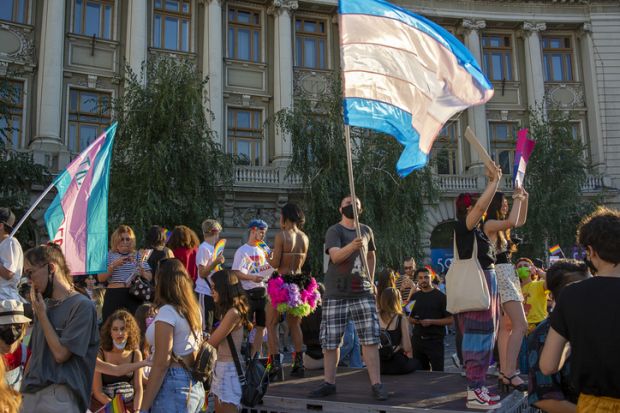Australia’s academic union has issued a warning to “gender critical” researchers while resisting an internal push that could have led to their expulsion.
A motion drafted for the national council of the National Tertiary Education Union (NTEU) described gender critical research as “hate speech…masquerading as academic work” and declared that gender critical ideology was “not welcome in society or in our union”.
The motion was amended shortly before the council, an annual forum of hundreds of NTEU delegates, to “condemn the use of gender critical ideology when used to promote or defend transphobia”.
The amended version, which passed without further change, said “gender critical ideology” was “a term that is used to defend transphobic ideology and when used to do so is not consistent with academic freedom”.
Gender critical theory holds that while individuals can change their gender identities, their sex at birth is immutable. Exponents have attracted hostility in academia and beyond.
In the UK, philosopher Kathleen Stock resigned from the University of Sussex following what has been described as a bullying campaign over her gender critical views. Professor Stock said the institution’s branch of the University and College Union had “effectively ended my career” by calling on Sussex’s management “to take a clear and strong stance against transphobia”.
Early career academics in the UK subsequently accused the union of fostering an intimidatory climate and inhibiting freedom of expression by failing to support scholars facing harassment and ostracism for their views on sex and gender.
The 2021 NTEU national council rebuffed a motion to have gender critical theory condemned as “hate speech”, with union executives insisting that the union’s role did not include judging the legitimacy of research fields.
While the latest national council has also balked at outright condemnation of gender critical research, critics said the new clauses – to be inserted in the NTEU’s manual – were “nebulous” and open to interpretation.
Political scientist Colin Wight, an emeritus professor at the University of Sydney, said the motion did not define what was meant by “gender critical” or “transphobia” and a clause combining the two “could mean anything”.
This amounted to a restriction on academic freedom, a “more important value than free speech. Free speech is about the protection of society, and societies set their own boundaries on that. Academic freedom is about the protection of truth, and no society or organisation should be setting boundaries on that.”
Nick Osbaldiston, an associate professor of sociology at James Cook University, said the motion increased the risk of academics – mostly women – being labelled “transphobic” for making all sorts of observations.
“This is just another chilling moment in the academy for younger academics in particular who feel they cannot say anything for fear of ostracism from their peers and colleagues.”
The original motion to the NTEU council said the executive had damaged the union by failing to condemn gender critical ideology last year. “Queer and ally members” had resigned or “publicly stated that they would never join a union that defended transphobia”, it said.
“Our union has a poorer image amongst an overwhelmingly queer-positive sector and many activists have spent their time organising internally instead of broadening our strength to work on common goals.”
Register to continue
Why register?
- Registration is free and only takes a moment
- Once registered, you can read 3 articles a month
- Sign up for our newsletter
Subscribe
Or subscribe for unlimited access to:
- Unlimited access to news, views, insights & reviews
- Digital editions
- Digital access to THE’s university and college rankings analysis
Already registered or a current subscriber? Login








